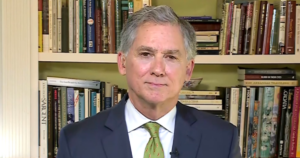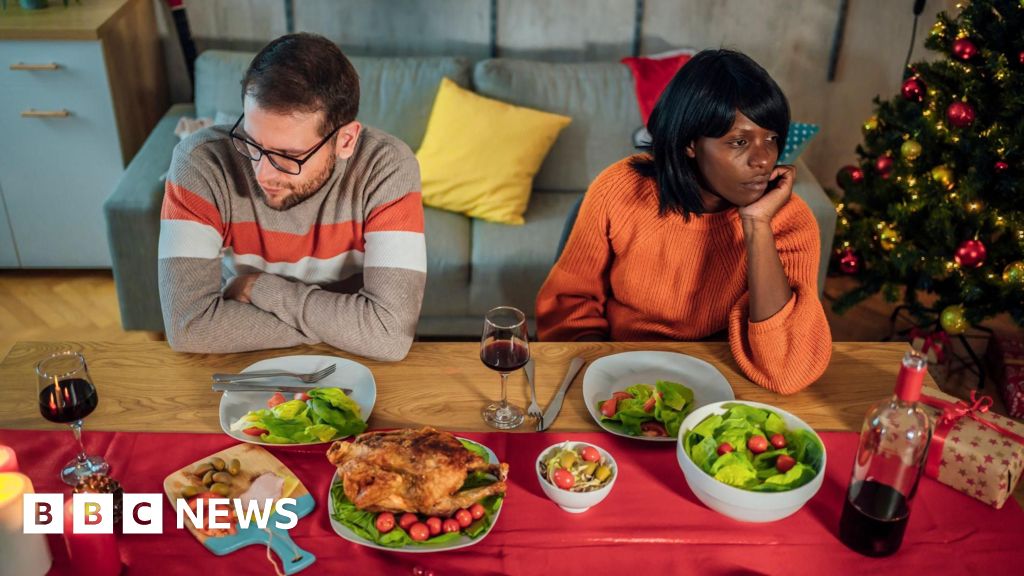
 Getty Images
Getty ImagesWhether it’s opening presents or the long-awaited Christmas dinner, the festive season involves plenty of things that could go wrong.
It’s the little things that count at this time of year – and your etiquette is no exception.
The BBC has chatted with experts about potentially awkward moments you might face over the next few days, so you can try to avoid them.
A common festive issue is getting a present you do not like. Is it best to tell the person who gave it to you, or lie that you love it?
It depends on how well you know the person who gave you the gift, according to Rupert Wesson from professional coaching company Debrett’s.
To lie – or not to lie
“There are some people [to whom] you can say the gift isn’t for you, and for some you have to smile and tell them a little white lie that you like it,” he tells the BBC.
But whatever you do, “don’t make a funny face” at the gift when you open it, warns etiquette coach Laura Windsor.
“Just pretend you do [like it], and make a little comment on how useful the gift will be,” she says. “The etiquette is always to be kind.”
Both etiquette coaches say it’s fine to give an unwanted present to charity or re-gift it for someone else in the future.
Mr Wesson suggests you should “always” keep a gift receipt when buying a present just in case – and he has these words of reassurance: “We can’t all be perfect at buying exactly the right thing.”
 Getty Images
Getty ImagesOpen up about the cost
While the cost of turkey and Brussels sprouts have gone down this year, the price of root vegetables have gone up and some families are feeling the pinch this winter.
Ms Windsor advises that you can make a “Christmas pot” that everyone contributes to ahead of the big day.
Alternatively, she says you could ask each guest – or family member – to buy an item of food or drink each.
“There’s no shame in this day and age in saying: ‘I’m getting people together for Christmas, would you be able to provide this?’,” Mr Wesson adds.
Stay upbeat – and avoid certain subjects
Sometimes petty arguments can flare up when the whole family is together – perhaps having eaten or drank too much.
Ms Windsor says “don’t take it personally, just try to smooth it over,” adding that you should not give people the “power to keep them complaining”.
She advises to try and change the topic of conversation, but to avoid difficult subjects.
“You’ve got to keep the conversation upbeat.”
If there are any existing tensions among the guests ahead of 25 December, Mr Wesson suggests attempting to address them upfront when you’re putting together your plans before Christmas Day.
“Almost make the invitation [to guests or extended family] conditional that someone isn’t going to kick off,” he says.
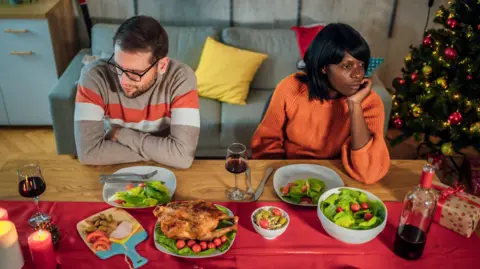 Getty Images
Getty ImagesIs it possible to say ‘thank you’ too much?
Ms Windsor advises against saying “thank you” to the host too much as it “loses its value”.
She suggests showing your appreciation to the host in other ways, including offering to help them with anything, bringing a gift for them – such as a bottle of wine or a plant – and mingling with other guests.
“Mix it up a bit by complimenting them on the quality of the food,” Mr Wesson says.
“Appreciation of how good the food is goes a long way.”
Both etiquette experts advise sending a thank you note to the host after Christmas Day which is something that Mr Wesson calls “the gold standard of thank yous”.
Be upfront about dietary requirements
If you have dietary requirements, such as being vegetarian or vegan, let whoever is hosting your Christmas dinner know ahead of time and not on 25 December, Ms Windsor stresses.
“It’s about prevention, preventing discord – everything has to be organised beforehand,” she says.
Mr Wesson adds: “It does fall to the host to really identify what the requirements are and then the host can plan.”
Ms Windsor says that if there is any tension between people about the dietary requirements, “be empathetic” but stop the conversation.
“If they make a non-cordial remark, don’t take it to heart.”
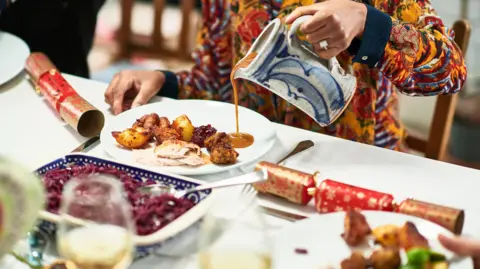 Getty Images
Getty ImagesThe Christmas dinner rules
If your stomach is growling for Christmas dinner and you’re growing impatient at how long it’s taking to cook, Mr Wesson suggests you could offer to help.
“Then you’re going to find the lay of the land and maybe suggest we can share something [to eat ahead of Christmas dinner],” he says.
But when you’re finally tucking into the dinner, what do you do if you don’t like it?
Say “yes” when asked if you’re enjoying the food, Ms Windsor says.
“If you don’t want to eat it, leave it,” she adds – and you could always just say you’ve “had enough” to eat.
Mr Wesson advises to “try and draw as little attention” as possible to the fact you are not eating the meal.
To prevent this situation happening, try to see if the host will let everyone plate up their own food and then “don’t pile too much on” in case you dislike it.
What to do if cards and gifts arrive after Christmas
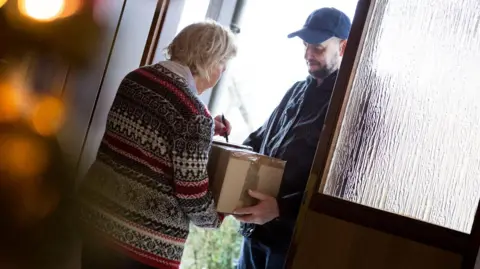 Getty Images
Getty ImagesWork, childcare, school – lots of things in life can get in the way and cause you to miss the cut-off date for sending Christmas cards and presents in time for 25 December.
Ms Windsor says organisation is “very, very important” because it shows that “you’ve put a lot of thought and put in the time and effort to make sure they get it in time for Christmas”.
However, she says that you have to “take into account people’s daily situation”.
Mr Wesson says that “better late than never is the way ahead” but advises people to send a message to whoever the card or present is addressed to, letting them know it is on the way and apologise for the lateness.
‘The golden rule’
Christmas Day all comes down to preparation – both organising the day and planning around family relationships, Mr Wesson says.
“It’s trying to expect the best but also accept the possibility things might go a little awry,” he says.
“Often these things aren’t really that serious and often doesn’t ruin the whole day.”
“The golden rule: treat others as you’d like to be treated,” Ms Windsor adds. “You won’t go wrong with that.”



